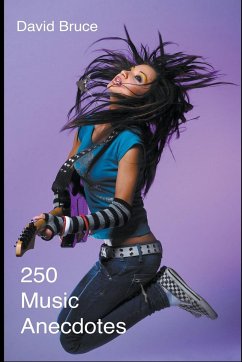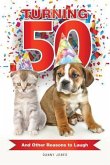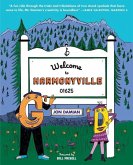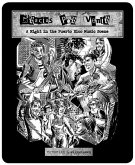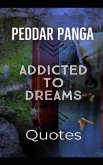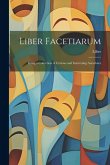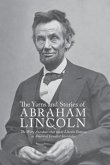This book is a short, quick, and easy read. It contains 250 music anecdotes, including these: 1) Hardcore group Black Flag sometimes played shows for very few people. In 1982, Black Flag played a show in Oklahoma City, Oklahoma, for two, or at most five people, who sat far away, in the back. Henry Rollins, lead singer, was mad, and he complained about the lack of audience just before Black Flag went on stage to perform. Fortunately, Black Flag bassist Chuck Dukowski talked to him, and in Mr. Rollins' words, "straightened me out on a few things." Mr. Dukowski taught him "that even though there were only a few people there, it didn't matter. They were there to see us, and that was good enough." Mr. Rollins, adds, "He said that you never pull a bullsh*t attitude on stage, and you always play your *ss off or don't play at all." Mr. Rollins remembers the show that Black Flag played that night. He says, "I played my *ss off that night." Mr. Rollins sings, performs spoken-word concerts, and writes. He says, "I am a guy who used to work at an ice cream store in Washington, D.C. I am of average intelligence. There's nothing special about me. If I can get this far, I would be very surprised if you couldn't get at least twice as far. F**k them. Keep your blood clean, your body lean, and your mind sharp." 2) One of the things that David Amram learned from fellow musician Miles Davis is that in jazz there are no wrong notes. Mr. Ashram explains, "By that he did not mean to play anything - he had the most beautiful selection of notes imaginable. But he meant anything that you have can move to something else if you have a right path." For example, early in Mr. Amram's career he was playing French horn with Charlie Mingus, and the cash register went off while he was playing and it bothered him. Mr. Mingus said, "Next time that happens, play off the cash register. Use that as part of the music. If you're playing, the piano player is going blockity-block, the drum is going buckita-bucka-ding. Put that into the music and answer it. Go bita-boo-boo-bum and answer the cash register. Make that part of the whole experience." 3) Leonard Bernstein and his family spoke a language that he helped to create with a childhood friend named Eddie Ryback. They named the language with an amalgamation of their names: Ryback plus Bernstein equals Rybernian. Nina, Mr. Bernstein's daughter, explains, "It's basically a way of mispronouncing things - Yiddish words as well as people who just talk funny." A London Times article explains that "I love you" becomes "Mu-la-du," and the appropriate response is "Mu-la-dumus" ("I love you more"). Sometimes, Mr. Bernstein would put on what his children considered to be airs, and they would tell him in Rybernian, "La-lutt" ("Shut up"). Nina says, "[T]hat would bring him right down to earth." 4) All copies of the December 1989 issue of Sassy, a magazine for North American teenage girls, contained a flexidisc of R.E.M. covering the song "Dark Globe" by Syd Barrett. Sassy editor Jane Pratt walked by Tower Records and was happy to see that every copy of Sassy had been sold - until she noticed a trashcan filled with copies of Sassy. R.E.M. fans had bought Sassy, thrown away the magazine, and kept the flexidisc.

